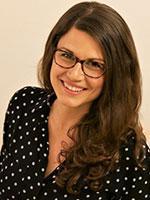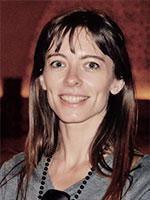December 2019
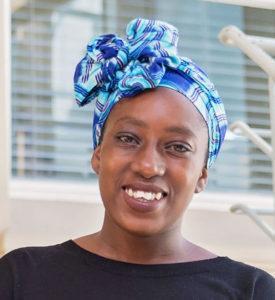 Cheleka Mpande from Zambia and currently based in South Africa, is our ambassador of the month. Cheleka is a PhD student in immunology researching on T cell immunology in the context of Tuberculosis infection. She joined the Immunopaedia team in December 2017, as Junior Communications Officer, and has made valuable contributions by writing articles and assisting Bonamy Holtak with facilitating our online-course materials.
Cheleka Mpande from Zambia and currently based in South Africa, is our ambassador of the month. Cheleka is a PhD student in immunology researching on T cell immunology in the context of Tuberculosis infection. She joined the Immunopaedia team in December 2017, as Junior Communications Officer, and has made valuable contributions by writing articles and assisting Bonamy Holtak with facilitating our online-course materials.
Position: PhD Candidate
Research Institute: South African Tuberculosis Vaccine Initiative (SATVI), Institute of Infectious Diseases & Molecular Medicine and Div. of Immunology, Faculty of Health Sciences, University of Cape Town
Research interests: Tuberculosis, classical (CD4) T cell immunology, TB vaccines
Recent publications: Mpande et al., 2018. Functional, Antigen-Specific Stem Cell Memory (TSCM) CD4+ T Cells Are Induced by Human Mycobacterium tuberculosis Infection. Frontiers in Immunology.
Watch visual summary of the article created as part of the Immunopaedia-Keystone Sci-talks collaboration.
If I wasn’t an immunologist I would be: An aeronautical engineer or astronomer. I was always fascinated with science and enjoyed learning new things. As I child one of my many fascinations was space: the different stars, moons, planets and what was beyond our solar system. I actually wanted to go to space and become astronaut. Knowing how difficult it would to be become one, being an aeronautical engineer or astronomer would be the closest thing to achieving this.
Why I love immunology: Knowledge gained from understanding immunology can be used to prevent many diseases, particularly infectious diseases. This is the main reason I started studying immunology. Many diseases that burden our continent (Africa) and the world are curable. However, not many people have access to good and affordable health care. If we could prevent these diseases using vaccines then we would have a healthier society, and a less burdened health care system.
Understanding the immunology of diseases progression and pathology is very vital to developing a vaccine. This is the main reason I joined my current research group, the work we conduct in translation TB research and TB vaccine discovery, is very important and contributes to hopefully achieving a “world without TB”.
Tips for young people who want to enter the field of immunology: Be aware of how vast immunology is, and remember that immune cells work within a system. Read out of your research focus, you never know where inspiration for your next research may come from.
What being an Immunopaedia Ambassador means to me: Being part of immunopaedia has given me the opportunity to read outside my research focus. Over the past year, I have learnt more about parasitology immunology, cancer immunology and how cell populations behave differently based on the microenvironment. Additionally, it has also awarded me the opportunity to improve my soft admin skills by assisting with the online courses and quizzes we facilitate. In the past year I have learnt and I am still learning how to relay the immunological messages in the clearest and least complicated way. As you know immunology is very complex.
How I have contributed to Immunopaedia so far: I have written most of the breaking news articles and also manage the Immunopaeia Ambassadors program. I assist Bonamy Holtak, who does a great job in organising and curating our online courses and website. I have also had the opportunity to facilitate the use of Immunopaedia at the Infectious Diseases in Africa workshops
How can you get in touch with me ? LinkedIn & Twitter
November 2019
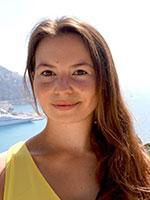 Maria-Bernadette Madel from Germany, is our Ambassador of the month. Maria-Bernadette is a PostDoctoral Fellow in immunology researching on inflammatory disorders such as Osteoimmunology. She joined the Immunopaedia team last year, and has made valuable contributions by writing articles on “The Immune Function of Osteoclasts” and “ECTS2018 – Where scientific research and clinical practice meet”, as well assisting with curating our MCQs.
Maria-Bernadette Madel from Germany, is our Ambassador of the month. Maria-Bernadette is a PostDoctoral Fellow in immunology researching on inflammatory disorders such as Osteoimmunology. She joined the Immunopaedia team last year, and has made valuable contributions by writing articles on “The Immune Function of Osteoclasts” and “ECTS2018 – Where scientific research and clinical practice meet”, as well assisting with curating our MCQs.
Position: PostDoctoral Research Fellow
Research Institute: CNRS UMR 7370, LP2M, Université Côte d’Azur, Nice, France
Research interests: Osteoimmunology, Inflammation and Rheumatology
Recent publications:
Madel MB, Ibáñez L, Rouleau M, Wakkach A, Blin-Wakkach C. A Novel Reliable and Efficient Procedure for Purification of Mature Osteoclasts Allowing Functional Assays in Mouse Cells. Front Immunol. 2018 Nov 2;9:2567.
Chypre M, Madel MB, Blin-Wakkach C, Morice C, Mueller CG. Porphyrin derivates inhibit the interaction between receptor activator of NF-kB and its ligand. ChemMedChem. 2017. Oct 20;12(20):1697-1702.
If I wasn’t an immunologist I would be: I would be engaged in forensic research or an archaeologist
Why I love immunology: The immune system plays an incredibly important role in our body. For me it is exciting to see how narrow the gap is between physiological and pathological conditions and how they can be regulated and modified. The possibilities of implementing the findings from basic research in clinical practice make it such an exciting and endearing scientific discipline.
Tips for young people who want to enter the field of immunology: The great thing about immunology is that it is a permanently developing field and therefore never gets boring. However, you should always keep up to date, ask as many questions as possible, discuss your research with others and keep track of the literature. Most importantly, you should be enthusiastic about your experiments, enjoy what you are doing and never forget why immunology is important to you because only then you can pass on the passion you have to others.
What being an Immunopaedia Ambassador means to me: It means a lot to me to be an Immunopaedia Ambassador because you can communicate both basic and clinical immunological research to others. Being an Ambassador is a fantastic way to build a network, to exchange your experiences in the field and to share knowledge. Immunopaedia gives me the possibility to learn constantly from others and it provides a plethora of insights into any immunological area. Being part of the Immunopaedia community makes me very proud and I am glad to contribute to its growth.
How I have contributed to Immunopaedia so far: I try to promote Immunopaedia at every opportunity. Either at our institute as well as during my lectures as an expanding learning aid for my students, but also at international congresses, where I had the opportunity to promote Immunopaedia to a wide audience. Furthermore, I contributed to the breaking news page with my article “ECTS2018 – Where scientific research and clinical practice meet” and I was invited to create some Multiple Choice Questions for the topic “Inflammation and Autoinflammation”.
How can you get in touch with me ? LinkedIn & Twitter
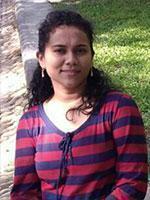 October 2019
October 2019
Babita Balakrishnan from India, is our Ambassador of the Month. Babita joined the Immunopaedia team in 2018 and has been a valuable member of the team. During her tenure, she has contributed to online quizzes, assisted with curating the online IUIS-IIS-FIMSA Immuno-Jaipur course and submitted breaking news articles on maternal-foetal immunotolerance and inflammation-induced osteoporosis.
Position: Reviewer
Research interests: Osteoimmunology and Transplantation Immunology
Recent publications:
Akanksha Dixit*, Babita Balakrishnan* and Anjali Karande. Immunomodulatory activity of glycodelin: Implications in allograft rejection, Clinical and Experimental Immunology. 2018, 192(2), 213-223, *Joint first author
If I wasn’t an immunologist I would be: An Artist
Why I love immunology: Because understanding the immune system helps unravel the details of how a living organism fights a foreign intruder in the body and how it attains tolerance to antigens. Knowledge of immunology has led to development of innumerable drugs and vaccines against debilitating health conditions. This fascinates me to know more and more about our immune system.
Tips for young people who want to enter the field of immunology: One should enjoy reading and learning immunology. Get a thorough picture of the subject by clearing the concepts and basic principles. Also, keep oneself abreast of the latest development in the field.
What being an Immunopaedia Ambassador means to me:As rightly said by Immunopaedia, Immunology without borders; I feel privileged to be a part of this group which is engaged in spreading knowledge and recent breakthroughs in the subject across the globe
How I have contributed to Immunopaedia so far: I have written breaking news articles, submitted questions for MCQs and also promoted Immunopaedia on social networking sites like LinkedIn and Facebook.
How can you get in touch with me ? LinkedIn & ResearchGate
September 2019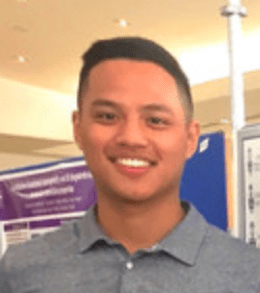
Our ambassador of the month is Bryan Gascon. Bryan become an Immunopaedia ambassador last year while he was a visiting students at the University of Cape Town. He has contributed to the online platform by developing MCQs for various immunology topics, assisted with content for ImmunoKenya as well as written numerous news articles.
Name: Bryan Gascon
Position: Staff Research Analyst at the Princess Margaret Cancer Center, and incoming Master of Science (MSc) candidate in the Institute of Medical Science, University of Toronto
Research Institute: Princess Margaret Cancer Center, University Health Network.
Research interests: Psychoneuroimmunology, health services, clinical epidemiology, infectious diseases/tropical diseases, cancer
Recent publications:
Ikumi, NM., Bangani, N., Barboure, M., Alinde, B., Gascon, B., et al.., . The Impact of HIV Exposure on Placenta Pathology and Regulatory T Cells. Poster presentation: 2019 Conference on Retroviruses and Opportunistic Infections (CROI); March 4-7, 2019; Seattle, Washington, USA. Abstract 322.
Kariyawasam, R., Gascon, B., et al., 2018. Spectrum of Bacterial Pathogens in Inflammatory and Non-Inflammatory Ulcers of American Cutaneous Leishmaniasis. International Journal of Infectious Diseases, 73, p.306.
Why I love immunology: The ‘curiosity mind-set’ required to advance in the field of immunology has really captured my interests and forms one of the reasons why I find this field fascinating. Understanding the emerging complex intersections immunology has with human evolution and more recently, mental illness, is challenging, but at least it’s never boring!
Tips for young people who want to enter the field of immunology: As a young, budding scientist myself, my tip for ‘young’ people who want to enter ANY field within the realm of research/medicine is to seek mentorship from those more senior than you. There really is no substitute for good mentorship. Cultivate your curiosity in particular areas of research/medicine that you genuinely find most interesting, and reach out to the principal investigators (PIs) who are leading projects in these areas. Once you begin working with said PIs, practice being independent, but still seek feedback early and often with regards to your specific project and make sure to solicit general career-wisdom. Most PIs have academic appointments at reputable universities, which means being a teacher within their arena of expertise is a hard requirement, so don’t be afraid to seem ‘annoying’. Anyone who labels you as such is unlikely to be someone who has your best interests in mind and therefore, not someone you want to be working with anyways.
What being an Immunopaedia Ambassador means to me: Being an Immunopaedia Ambassador means that I’m able to collaborate with a community of scholars to disseminate immunology knowledge at a global-level.
How I have contributed to Immunopaedia so far: With my undergraduate background in immunology at the University of Toronto, I have developed and published ~40 multiple choice questions across numerous advanced immunology topics (complete them for CDP points!). In addition, I also developed pre-course content (HIV and cancers) for the ImmunoKenya course offered in September 2018, and will be contributing content related to psychoneuroimmunology in the form of paper and clinical cases in the near future.
How can you get in touch with me ? LinkedIn and Twitter
August 2019
Our ambassador of the month is Kathrin Held, she is a Research Scientist at the University Hospital, LMU(University of Munich), Germany. Kathrin has made a major contributed to Immunopaedia, by promoting Immunopaedia and writing multiple news articles.
Name: Kathrin Held
Position:Research Scientist
Research Institute: Division of Infectious Diseases and Tropical Medicine; University Hospital, LMU Munich
Research interests: Immunology of infectious and autoimmune diseases.
Recent publications:
Ahmed et al., 2018. Phenotypic Changes on Mycobacterium Tuberculosis-Specific CD4 T Cells as Surrogate Markers for Tuberculosis Treatment Efficacy. Frontiers in Immunology. Read her summary.
Nadai, Held et al., 2019. Envelope-Specific Recognition Patterns of HIV Vaccine-Induced IgG Antibodies Are Linked to Immunogen Structure and Sequence. Frontiers in Immunology. Read her summary.
Gerdes, Held et al., 2016. CTLA4 as Immunological Checkpoint in the Development of Multiple Sclerosis. Annals of Neurology.
Why I love immunology: The immune system has such complexity as it pervades all areas of biology, from its more known function in defence against infections, to its “dark” side in autoimmunity and even to a role in shaping the nervous system.
If I wasn’t an immunologist I would be: On days where experiments don’t work and deadlines are looming, I dream of a quiet life in beekeeping. But seriously, I probably would be a pathologist. How cells interact to form functional tissue is quite fascinating.
Tips for young people who want to enter the field of immunology: Stay curious, do not give up if experiments and studies do not work out the way you had planned, and importantly don’t forget to have fun, both in science as well as outside of it.
What being an Immunopaedia Ambassador means to me: A big part of life in science is communication, education, and connections to other scientists – all of which is part of the Immunopaedia spirit. It is great to be part of this.
How I have contributed to Immunopaedia so far: I have written breaking news articles for the Immunopaedia on different aspects of immunology from interactions that occur during HIV replication, to studying HIV-sp antibodies induced by vaccination and markers of TB treatment efficacy
How can you get in touch with me ? Research Gate; Website
July 2019
Our ambassador of the month is Dana Manuela Savulescu, she is a Medical Scientist at the National Institute for Communicable Diseases, Johannesburg, South Africa. Thank you Dana for contributing to Immunopaedia.
Name: Dana Manuela Savulescu
Position: Medical Scientist
Research Institute: Centre for Vaccines and Immunology (CVI), National Institute for Communicable Diseases, Johannesburg, South Africa
Research interests: Immunology of pregnancy, development of the immune system in infants, the relationship between the endocrine and immune systems, HLA antibodies, immune tolerance.
Why I love immunology: Immunology fascinates me because the immune system has a major role in our overall function, controlling and taking part in so many aspects of the human body! I started my journey as an immunologist after having completed a PhD in molecular and cellular endocrinology of the reproductive axis. I’m very interested in the relationship between the immune and the endocrine systems, especially in the context of human reproduction.
I’m also fascinated by the evolutionary and philosophical aspects of immunology – why and how did the immune system evolve the way it did, with both innate and adaptive functions, and with its multiple cell types and immune reactions? Also – what is its core role – is it to protect us from infections or rather to prevent us from attacking our “self”; is it to enable us to fight invaders or to make us tolerant, and (philosophically speaking) what is the actual difference between the two?
If I wasn’t an immunologist I would be: An endocrinologist specializing in human reproduction and/or a science journalist.
Tips for young people who want to enter the field of immunology: First thing is – welcome to this fascinating field! Always remember not to take the textbooks as the absolute truth – our knowledge of immunology is constantly evolving.
Also – and I find this so important – remember that we, researchers, are the ones who categorize immune cells into different types (M1/M2 macrophages, regulatory T cells, etc’), but what happens in vivo is probably much more complex than that – cells might be able to transition from one “type” to another and secrete different types of molecules, depending on the context, etc’. In other words, cells don’t know that they are Tregs/M2s, etc’ 😉
And lastly, don’t forget to always keep the big picture in mind, i.e. always ask yourselves what your research questions and findings would mean from an evolution and development of the immune system point of view.
What being an Immunopaedia Ambassador means to me: It’s a great platform for sharing my love for immunology and promoting the field, as well as finding out about the work of other immunologists across the world.
How I have contributed to Immunopaedia so far: I have composed MCQs for the Autoimmune and Tolerance special focus; I have interviewed Dr Nashied Peton ; I have re-posted several Immunopaedia articles on the South African Immunology Society (SAIS) and Federation of African Immunological Societies (FAIS) LinkedIn pages, which I manage; I have promoted Immunopaedia in my institute, having uploaded the link to its website on CVI’s website.
How can you get in touch with me ? LinkedIn: Dana Savulescu
June 2019
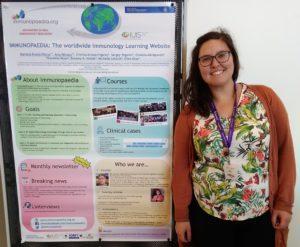
Amy Mónaco presenting a poster about Immunopaedia mission and goals. Highlighting the courses availables, the ambassador program and other immunology content on our website
Our ambassador of the month is Amy Mónaco, she is currently pursuing her Doctoral degree at the Instituto de Higiene (Facultad de Medicina – Universidad de la República). Thank you Amy for contributing to Immunopaedia.
Name: Amy Mónaco
Position: PhD candidate and research associate
Research Institute: Departamento de Desarrollo Biotecnológico at the Instituto de Higiene (Facultad de Medicina – Universidad de la República)
Research interests: Tumor immunology, immunotherapies based on bacteria
Latest Publication: TLR7 agonist in combination with Salmonella as an effective melanoma immunotherapy, doi: 10.2217/imt-2017-0188. There is an article highlight featured on Immunopaedia website on December of last year if you want to know more!
Why I love immunology: Because getting to know everything that goes on inside your body when encountering a pathogen is like magic. And getting to alter it is even better!
If I wasn’t an immunologist I would be: Not sure but probably a chef! Cooking is like following protocols in the lab as well as being creative, and both professions are constantly under pressure!
Tips for young people who want to enter the field of immunology: As Coldplay says in The Scientist song: “Nobody said it was easy”… but is totally worth it! Work hard, love what you do, do not let yourself be defeated. When we fail is when we learn more.
What being an Immunopaedia Ambassador means to me: To be able to share my love for immunology around the world!
How I have contributed to Immunopaedia so far: I have been ambassador for less than a year but I spread the word about Immunopaedia every meeting I go, showcasing a poster or performing short presentations. I have also contributed with an interview, an article highlight and I am currently preparing a congress report.
How can you get in touch with me ? LinkedIn: Amy Mónaco Patiño
May 2019
 Our ambassador of the month is Maxwell Chan, he is currently pursuing his undergraduate degree at the University of Toronto. Thank Maxwell for contributing to Immunopaedia.
Our ambassador of the month is Maxwell Chan, he is currently pursuing his undergraduate degree at the University of Toronto. Thank Maxwell for contributing to Immunopaedia.
Name: Maxwell Chan
Position: Undergraduate Project Student
Research Institute: Ted Rogers Centre for Heart Research / University of Toronto
Research interests:Fibrosis, Fibroblast migration, Cardiology, Wound healing
Why I love immunology: Immunology plays a role in countless other biological and medical sciences. As I finish up my undergraduate degree, I’ve come to realise how integral Immunology is. While most people would not associate Cardiology with Immunology, the latter is very relevant to some cardiomyopathies, inflammation, and organ transplant.
If I wasn’t an immunologist I would be:Hopefully a dentist! I’m keen on entering the healthcare field and working with patients.
Tips for young people who want to enter the field of immunology: Talk to your professors! Researchers might seem intimidating, but they’re people too. Networking is an essential part of any field and it will help you land your first research experience.
What being an Immunopaedia Ambassador means to me: Being an Ambassador means sharing my interest in Immunology with others and making it more accessible for people outside of Immunology.
How I have contributed to Immunopaedia so far: I’ve served as a staff writer in the past and helped update some of the pre-courses offered by Immunopaedia. Now, I occasionally contribute articles for the Breaking News section and promote the site at the University of Toronto.
How can you get in touch with me ? by email: Maxwell.chan@mail.utoronto.ca
March 2019
Our ambassador of the month is Mahaman Moustapha Lamine from Senegal. He is PhD candidate at the Centre of Medical and Health Research of Niger (CERMES), and also holds a lecturing position at University of Zinder . He has showcased Immunopaedia at his research institute and conducted our March Immunologist of the month interview. Thank Mahaman for contributing to Immunopaedia.
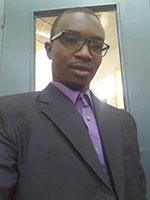 Name: Mahaman Moustapha Lamine
Name: Mahaman Moustapha Lamine
Position: PhD-Student, Lecturee at University of Zinder
Research Institute: Centre of Medical and Health Research of Niger (CERMES)
Research interests: Immuno-genetic of malaria
Why I love immunology: Because it’s amazing (and important) to know how our organism ministry of defence work
If I wasn’t an immunologist I would be:Pigeon Fancier
Tips for young people who want to enter the field of immunology: Immunology is a transversal and an indispensable tool for biomedical research
What being an Immunopaedia Ambassador means to me: Promoting the immunology around the world
How I have contributed to Immunopaedia so far: I promote immunopedia in my research institute and my university. I also conducted the March Immunologist of the month interview.
Online Profile: ResearchGate – Mahaman Moustapha Lamine
January – February 2019
This month we conducted a special video interview of Abdouramane Camara and Vicky Gent. Both ambassadors attended the 8th Infectious Diseases in Africa Symposium in November 2018, where they were selected as rapporteurs and provided summaries on Malaria and TB vaccines sessions.
Abdouramane Camara
Current position? PhD student in Immunology
Research Institute? Institute of Molecular and Cellular Biology (IBMC), Strasbourg-France
Research interests? Immunology, Molecular biology, Infectious diseases
Vicky Gent
Current position? Graduate Assistant
Research Institute? Jomo Kenyatta University of Agriculture and Technology, Kenya
Research interests? Immunomodulators, Vaccine development, Neuroimmunology
Interview by Cheleka AM Mpande






